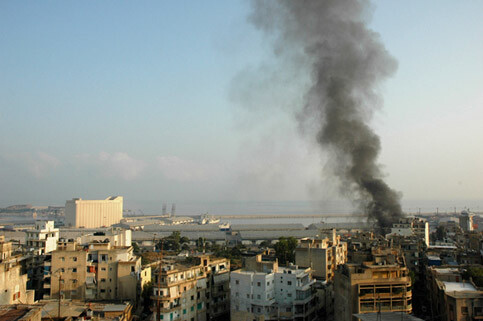IRIN 17 July 2006

Israeli attack on port this morning - reportedly killing two civilians. (Peter Speetjens/IRIN)
BEIRUT - Local health workers say they face difficulties reaching the injured in southern Lebanon following furious Israeli artillery barrages and air strikes that came in response to the 12 July kidnapping of two Israeli soldiers by Hizbullah.
“We’re cooperating with NGOs and other humanitarian associations to help us cope with the situation,” Minister of Health Muhammad Jawad Khalifa told IRIN. “But we’re experiencing difficulties in accessing affected areas to help the injured.” Khalifa added that 175 deaths and 500 injuries had been reported since the bombing began on 12 July.
Hizbullah has been fighting back with rockets fired at Israel, killing 12 people. The militant group says it will release the two soldiers in exchange for Lebanese prisoners held in Israel.
Dr Abdel Rahim Hennawi, director of the Hammoud Medical Centre in Sidon, 45 km south of Beirut, expressed particular concern about the lack of dialysis treatment.
“We were known for having the best facilities for dialysis in southern Lebanon,” he said. “Now we’re short of bloodline solutions because the roads are closed, and patients keep coming in.” Hennawi added that the centre had received 48 injury patients from towns and villages in the south, mostly consisting of burns or head, abdomen and limb injuries.
Health institutions in the capital have also warned of waning medical supplies amid rising numbers of casualties. “We’ve received injured civilians from Haret Hreyk a southern suburb of the capital, as well as the bodies of two civilians killed this morning in raids on Beirut harbour,” said one official at Beirut’s Rafik Hariri University Hospital, speaking on condition of anonymity.
The official added that, should the Israeli attacks continue, supplies would be exhausted within a few days. “We’re being assisted by the health ministry because the emergency service wasn’t ready to receive patients,” he said. “We’re coping, but we can’t predict what will happen in the future.”
Meanwhile, Lebanese Doctors Syndicate head, Dr Mario Aoun, called on the country’s thousands of doctors and medical workers to report to the university hospital to help treat the injured. “We weren’t expecting the rising number of victims, but we’re trying to cope with the disaster,” said Aoun, adding that a special crisis unit was working to transport doctors to medical facilities in affected areas.
Related Links
This item comes to you via IRIN, a UN humanitarian news and information service, but may not necessarily reflect the views of the United Nations or its agencies. All IRIN material may be reposted or reprinted free-of-charge; refer to the copyright page for conditions of use. IRIN is a project of the UN Office for the Coordination of Humanitarian Affairs.